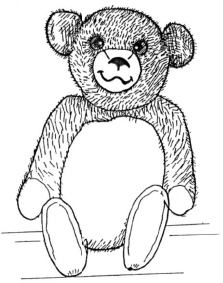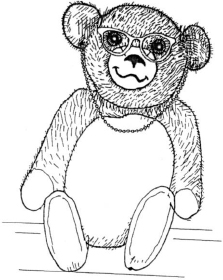Ed McBain_Matthew Hope 12 (3 page)
Read Ed McBain_Matthew Hope 12 Online
Authors: Gladly the Cross-Eyed Bear
Tags: #Hope; Matthew (Fictitious Character) - Fiction, #Detective and Mystery Stories, #Lawyers, #Mystery & Detective, #Hope; Matthew (Fictitious Character), #Lawyers - Florida - Fiction, #Florida, #Legal, #Fiction, #Legal Stories, #General, #Florida - Fiction

Gladly comes to her out of the blue.
She’s been working since early this morning, constructing a model for a fire engine with a girl doll at its wheel and several
other girl dolls, all with flowing red hair the color of the truck, hanging from its sides. Casting each delicate doll from
individual wax models, hanging them on the deliberately macho prototype truck she’s constructed of wire and wood, she finds
herself humming as she works, and oddly—
Ideas sometimes come this way, she tells the Court.
—one of the tunes she initially hums and then actually begins singing is a hymn called “Keep Thou My Way,” which she learned
when she was a little girl growing up in Winfield, Alabama, and attending a Bible-reading class taught by a woman named Helen
Lattimer.
Keep Thou my way, O Lord
Hide my life in Thine;
O let Thy sacred light
O’er my pathway shine.
Kept by Thy tender care,
Gladly the cross I’ll bear
Hear Thou and grant
…
…and she remembers all at once that in all the children’s minds “Gladly the cross I’ll bear” became “Gladly the cross-eyed
bear,” in much the same way that “Round yon virgin” in “Silent Night” became a chubby little man whose name was John Virgin,
or “Lead on, O king eternal” in yet another hymn became “Lead on, O Kinky Turtle.” And suddenly she thinks Oh, God, a whole
line
of stuffed toys, starting with the Cross-Eyed Bear and going from there to the Kinky Turtle and Round John and who knows
what
other characters I might find in the malaprop depths of rural America!
She rolls the fire truck to one side of the table, opens a pad, and begins sketching, starting with the outline of the bear’s
head, tilted to one side, and then filling in the crossed eyes and the silly little grin under its black triangular nose—
And here she shows the original drawing to the Court:

“I would like to offer Ms. Commins’s drawing in evidence, Your Honor.”
“Any objections?”
“None.”
Lainie makes some twenty drawings of the bear that night, working feverishly from the moment of inspiration to one in the
morning, and she goes to sleep exhausted but content until she wakes up in the middle of the night with her eyes burning,
and goes into the bathroom to put some Visine drops into them, and recalls how devastated she’d felt when the ophthalmologist
in Birmingham reported that the second operation had not helped her condition, and standing there in the bathroom with the
eyedropper in her hand, she thinks I’ll fix
Gladly’s
eyes! and runs out into the studio again, and puts on her own glasses and begins sketching
Gladly
wearing eyeglasses.

“I offer the following eighteen drawings in evidence, Your Honor.”
“Objections?”
“None.”
“All right to offer them all as a single piece of evidence, Mr. Hope?”
“If it please the Court.”
“That’s five for the plaintiff,” Santos said.
“As I understand this,” I said, “when the eyeglasses are placed on Gladly’s nose, covering her eyes…”
“Yes.”
“…the eyes look perfectly normal.”
“Yes. Facing her and looking at her eyes through the glasses …”
“Could you show us, please?” I said, and handed her the prototype bear with the eyeglasses hanging on a chain around her neck.
While Gladly watched in glassy cross-eyed expectation, smiling goofily, Lainie opened the glasses, perched them on the bear’s
snout and little black triangular nose, and hooked them behind her ears. Instantly and magically, the previously crossed eyes
appeared normal.
“You put on the glasses,” Lainie said, “and the eyes aren’t crossed anymore.”
“How do you achieve that effect, Ms. Commins?”
“I had an optometrist design the glasses for me.”
“Do you have specifications for these glasses?”
“I do.”
“I refer you to exhibit three, the certificate of copyright registration for your bear, and ask you to look at the deposit
copies accompanying it. Are these the specifications to which you just made reference?”
“They are.”
“And did these specifications accompany your application for copyright registration?”
“They were a part of the application, yes.”
“And became a part of the copyright protection, didn’t they?”
“Objection!”
“Sustained.”
“Your Honor, if I may…”
“Yes, Mr. Brackett?”
“Your Honor,” Brackett said, “it is not Ms. Commins’s business to know or to comment upon copyright law.”
“I sustained your objection, didn’t I?”
“Yes, and thank you, Your Honor. But, moreover, Your Honor,
eyeglasses
in themselves are not copyrightable, they are not subject matter for copyright. Copyright does not protect ideas or systems,
it protects only the
expression
of ideas.”
“Yes, I know that,” Santos said. “I’m quite familiar with the ‘idea/expression’ distinction.”
“I’m sure, “Your Honor. But for counsel to suggest that copyright protection of the
bear
extends to the bear’s
eyeglasses
…”
“Your Honor,” I said, “the eyeglasses are part of the bear’s trade dress. As such…”
“All of which is a matter of law for the Court to decide. Meanwhile, let’s hear the rest of the testimony.”
“Thank you, Your Honor,” Brackett said.
“Ms. Commins,” I said, “do you
own
these specifications?”
“I paid for their design, yes, in return for all rights to the drawings and the unrestricted use of the design.”
“Has anyone else, to your knowledge, ever used such a design in this manner before?”
“Not to my knowledge.”
“To your knowledge, has anyone ever used such a design in the form of eyeglasses for a stuffed teddy bear?”
“Not to my knowledge.”
“Eyeglasses which, when covering the bear’s crossed eyes, seem to
correct
the abnormality? Anyone ever use this design in this fashion before?”
“Not to my knowledge.”
“Is this use original with you?”
“It is.”
“Did you conceive of this use independently?”
“I did.”
“Which goes to the heart of copyright law,” I said. “An original
manner
of expression, independently cre—”
“Which goes to the heart of a lawyer addressing the Court directly,” Brackett said, “rather than…”
“Sustained,” Santos said. “Careful, Mr. Hope.”
There was the fetid smell of mildew and rot, what you found in a lot of these condos built back in the forties and fifties.
Place was constructed of cinder block painted white, streaks of greenish gray all over it where the mildew had been having
its way for too long a time. Wooden posts rotted clear through, probably infested with termites, too, supporting a rippled
green plastic overhang running past the entrance doors to the units, twelve on each floor by Warren’s count. He came down
the long open corridor cautiously because the one thing he couldn’t change was his color.
Could borrow a dented red Subaru from a friend of his, could dress in tropical beige threads made him look like a visiting
real estate salesman or a banker come to call, he
still
looked out of place in this shitty run-down condo where the only tenants were white. So he came cautiously down that long
second-floor corridor with the sun hitting the rippled overhang at an angle that cast the plastic’s sickly green color onto
the corridor floor and the lower part of the white wall, and he prayed none of the doors along that wall would open, prayed
no one would step out to challenge him. He was a black man about to stealthily break and enter a structure or conveyance without
consent of the owner or occupant, but he wasn’t a burglar, and he didn’t choose to be mistaken for one.
Warren was carrying in his wallet a laminated card that had been issued in accordance with Chapter 493 of the Florida Statutes,
and which gave its recipient the right to investigate and gather information on a great many criminal and noncriminal matters
listed in detail in the statute. He took that card from his wallet now, and used it to loid the lock on the door to unit 24,
her
unit, sliding it deftly between doorjamb and Mickey Mouse spring latch, forcing the latch back until he felt the door give,
and then easing himself into the unit and closing the door behind him at once.
His heart was pounding hard.
Sidney Brackett was asking Lainie if it wasn’t true that she had developed the idea for her so-called original bear Gladly
while, in fact, she was still working at Toyland, Toyland. Lainie was vehemently denying this. Sitting at the defense table,
Brett and Etta Toland sat calmly watching the proceedings, secure in the knowledge that Brackett would impeach my first witness
and get this whole damned thing kicked summarily out of court.
Brett was forty-four years old, elegantly tailored in a blue blazer and gray slacks, white shirt open at the throat, no tie,
shoes invisible under the table—but I guessed they were tasseled loafers—suntanned face exploiting eyes as blue as glare ice,
thick blond hair casually styled. He sat holding his wife’s left hand in his own right hand. Together, they presented the
very image of solidarity against this impostor named Lainie Commins.
In Calusa society, such as it was, they were familiarly known as Lord and Lady Toland, though neither was either British or
aristocratic. Host and hostess supreme—I remembered an outdoor party where Japanese lanterns festooned the lawn of their multimillion-dollar
beachfront home, and goldfish swam in tiny bowls at the more than fifty outdoor tables, and the then governor of the state
of Florida was in attendance—invitations to their extravaganzas were sought like tickets to the Super Bowl, though I’d personally
felt somewhat uncomfortable in such resplendent digs, perhaps because I’d grown up poor in Chicago; maybe a person can
never
put poverty behind him.
Etta Toland…
Ett and Brett, they were called by close friends who cherished the Tolands,
and
their Fatback Key mansion,
and
their parties,
and
their tennis court and swimming pool,
and
their ninety-four-foot yawl named
Toy Boat, and
their private jet that didn’t have a name though both jet and yacht had painted respectively on fuselage and transom the
logo of their toy company, two dolls sitting with legs extended and heads together, the boy with blond hair, the girl with
black hair, each smiling radiantly. This same logo was on the little round tag attached to the second teddy bear on Matthew’s
table, little boy and girl with TOYLAND in a semicircle above their heads, and another TOYLAND in a semicircle below their
legs, TOYLAND, TOYLAND, for Toland, Toland, here now to defend themselves against Lainie Commins’s charges of copyright and
trademark infringement.
Thirty-seven-year-old Etta had hair as black as that on the little grinning girl-doll in the company logo, worn straight and
sleek and to the shoulders. High sculpted cheekbones, very dark almond-shaped eyes, and a generous mouth glossed with blood-red
lipstick collaborated with the straight, lustrous, jet-black hair to give her a somewhat Oriental appearance, although her
maiden name was Henrietta Becherer, and her forebears were German—a fact that didn’t stop competitors and/or detractors from
labeling her “The Dragon Lady.” Rumor had it that Brett had met her at a toy fair in Frankfurt, where she’d been pitching
at the Gebrüder Hermann booth. On this hot Tuesday morning in September, she looked cool, self-possessed, businesslike and
yet utterly feminine in a glen-plaid silk suit the color of twilight, worn with a dusky blue silk shirt open at the throat
over a medallion print scarf. Above the left hand clutched in her husband’s right, a gold cuff link showed where her jacket
sleeve ended.
“Do you remember which toys you were working on during your employment?” Brackett asked.
“Do you mean at Toyland?”
“Yes. That was…how long did you say you’d worked there, Miss Commins?”
